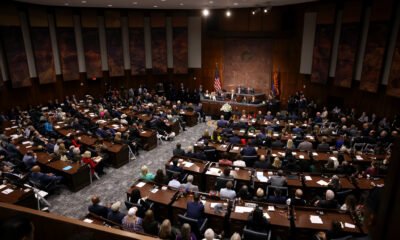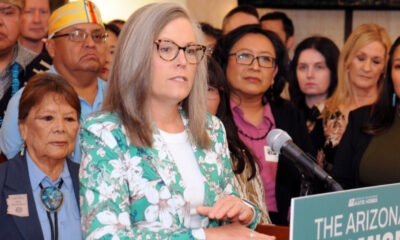Adrian Fontes
Arizona’s Next Generation of Election Workers: Bridging the Gap as Seasoned Pros Exit

In Arizona, the pressure on election officials to maintain high standards is immense. Some counties are addressing this by hiring compliance officers who ensure adherence to legal requirements. This role demands a unique skill set that blends technical knowledge of election processes with an understanding of state regulations.
This year, Pima County benefited from an enthusiastic candidate: Carly Morrison, a law student with relevant training. Constance Hargrove, elections director for the county, expressed her excitement when Morrison applied. “I’m like, ‘Yes!’” she said, reflecting the enthusiasm around Morrison’s candidacy.
Morrison’s interest stems from a larger initiative aimed at tackling workforce challenges in election administration. She is among 18 participants in the Arizona Fellows in Election Administration program, designed to counteract a significant talent shortage in county election offices.
Launched by Secretary of State Adrian Fontes, the program seeks to address vacancies created by experienced staff leaving the field—often due to increased scrutiny and hostility following unfounded fraud allegations. This dilemma affects not only Arizona but election offices nationwide.
Historically, there has been no clear pathway for students interested in election careers. Few colleges offer specialized courses, making practical training scarce. Fontes, aiming to bridge this gap, utilized federal funding to create a program that provides participants with a $15,000 stipend for a five-month engagement in election offices.
Morrison discovered this opportunity at a campus event in Tucson, where she initially found her passions aligning with the field of election administration. “This is how society works. It’s so important,” she emphasized, underscoring her newfound commitment.
While many are exiting the profession due to stress, Morrison remains undeterred, feeling a strong connection to her work. She received substantial support from Hargrove and other staff members. Hargrove believes that entrusting Morrison with significant responsibilities, such as overseeing early ballot preparations, played a crucial role in her retention.
A recent report from the Bipartisan Policy Center praised the fellowship program but suggested improvements, such as incorporating county officials into training sessions and defining clearer roles for participants.
In a bid to make the program permanent, Fontes is advocating for an additional $500,000 in the state budget. This funding would enable the hiring of two staff members and 20 fellows in fiscal year 2026, establishing a model for skilled election talent cultivation that Fontes hopes other states will follow.


















